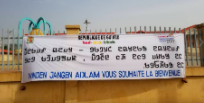In the first part of this series, I gave a brief overview of the creators of the ADLaM script and the work they did. You may read it here.
In this part, I am going to present some of the factors that mitigate the promotion and use of indigenous languages, based on an interview I had with Abdoulaye and Ibrahima Barry.
The first major challenge for indigenous languages is the general negative attitude of the indigenous speakers themselves towards the languages. The brothers believe this attitude is a product of colonisation.
In Guinea, if one does not know how to read and write in French, that person is regarded as illiterate, regardless of whether the individual is able to communicate effectively in Fulani and/or other indigenous languages. But this is not unique to the Republic of Guinea. In several other West African countries – and probably, the whole of Africa – it is often quite common to associate a person’s inability to read and write in the language of the colonialists with illiteracy.
The reason is not far-fetched. During the colonial era, acceptance into the circle of the elite demanded that one be proficient in the language of the colonial masters. As a matter of fact, school children used to be ridiculed and even punished for speaking the indigenous languages. Naturally, these languages became increasingly relegated until they attained the status of “second-class languages”; languages which were thought to be inconsequential to one’s success in life.This attitude towards one’s own language has been very detrimental to the longevity of many indigenous languages, as is evidenced by the ever decreasing level of mother-tongue proficiency.
The second issue raised by the brothers is the negative attitude of most African governments towards indigenous languages. Speaking on their experience at a UNESCO conference they recently attended in Paris, they opine that large countries like Russia show concern for the minority languages in their country. They talk about how these countries spend billions trying to revive languages which are on the verge of disappearing whereas most African governments, on the other hand, do almost nothing to preserve their indigenous languages. By contrast, they say, these countries invest heavily in promoting English, French, Arabic and other non-indigenous languages on the continent.
Thirdly, they discuss the impact on the promotion of indigenous languages caused by the use of “foreign” languages for instruction in formal institutions of learning. Abdoulaye shares the story of one of his Ivorian friends who works on the ADLaM projects. The lady in question was being taught in French when she first started attending school. At a later stage, she had to choose to learn either German or Italian. Today, she often wonders why she was never presented with the option of studying an African language.
The brothers further explain their concern over the issue. It makes no sense to them that people – particularly Africans – spend so much time and effort learning foreign languages without bothering to learn any of the languages of the continent on which they live, not even their own indigenous language. And as Ibrahima points out, only a few of these people who learn foreign languages actually move abroad, thus making it difficult to justify the purpose for which so much time is spent learning other languages.
“It makes no sense that a child speaks a language at home, in the market, in the neighbourhood, among friends, but goes to school only to be taught in a foreign language. That child would usually end up spending so much time learning a new language instead of acquiring knowledge. This is the situation in Africa. If, on the other hand, the child were to be taught in the same language he or she is already conversant with, all he or she needs to learn is how to write that language and acquire knowledge in it. And by mastering science and technology in your language, you can make it readily accessible to everyone in the community. But, because these foreign languages are used, only a small percentage of the population can access information in these languages.” – Abdoulaye and Ibrahima Barry.
Because they are often taught in languages that are not their mother-tongue, school children in Africa spend so much time trying to decode words and concepts in these languages; time which the brothers believe could be redirected towards direct learning. If the lessons were delivered in languages in which the children already use in their day-to-day activities. As a result, individuals who are unable to understand and express themselves in the foreign language are systematically written off as “illiterate” or “unintelligent”. This results in a loss of unique ideas and talent which would otherwise have been added to the global pool.
To stress the importance of learning one’s indigenous language, Abdoulaye further adds that learning indigenous languages could help with the issue of inter-tribal conflicts among ethnic groups in Africa. Their stance is that even if African languages do not serve as languages of instruction, young people should, at least, be given the opportunity to learn and know them.
Other challenges abound. Nevertheless, there is no giving up. After all, like Ibrahima says, “people have successfully revived some dead languages. For those (languages) that are not yet dead, hope is not lost; all that is needed is the willpower to do so.”
In the concluding part of this series, we will look at some practical steps to be taken by various parties to ensure the continuity of languages – and every one of us does have a role to play.
So, stay tuned for Part 3!
Stay tuned for the second part of this series!


